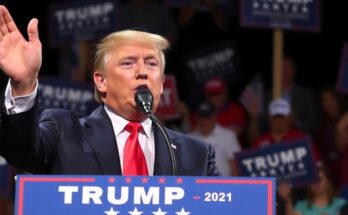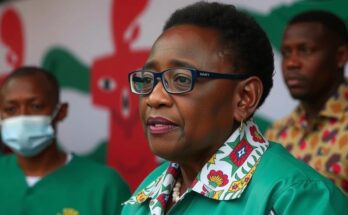Young voters in Ghana view the presidential election as a chance to escape economic hardship, yet their choices are restricted to a two-party race between Vice President Mahamudu Bawumia and former President John Mahama. Key issues include the cost-of-living crisis, unemployment, and concerns surrounding the integrity of the election process. Amidst high hopes for improved governance, the election outcome will significantly impact Ghana’s youth.
Young Ghanaians view the upcoming presidential election as a critical opportunity to address ongoing socioeconomic challenges, although their choices for potential improvement seem limited. Joseph Antwi, a first-time voter and trader in Accra, expresses his desire to replace the current government, noting dissatisfaction with its failure to keep electoral promises. The election features a historical two-horse race between Vice President Mahamudu Bawumia of the ruling New Patriotic Party (NPP) and former President John Mahama of the National Democratic Congress (NDC), both of whom are attempting to gain the trust of voters desiring economic stability and job creation. As the country grapples with a severe cost-of-living crisis, the candidates present their visions for the future amidst public discontent stemming from political and environmental issues, including illegal gold mining. Furthermore, concerns about the integrity of the electoral process have arisen as opposition parties have alleged potential vote rigging by the election commission. The prevailing sentiment among young voters reflects a yearning for change and a solution to pressing economic hardships, underscored by their hopes for a leader who can deliver positive outcomes.
The political atmosphere in Accra is vibrant, filled with rallying supporters and campaign promises aimed at winning over a populace eager for transformative leadership.
This election moment presents a significant yet uncertain avenue for the younger generation of Ghana, who hope to influence their country’s trajectory through their ballots this coming Saturday.
The political landscape in Ghana is characterized by a traditional two-party system, predominantly between the New Patriotic Party (NPP) and the National Democratic Congress (NDC). The youth, representing a considerable portion of the electorate, are particularly vocal about the pressing economic challenges they face, such as high inflation and unemployment, coupled with disillusionment towards the outgoing government. The upcoming election is critical for these young voters, as they seek change and a candidate who can authentically address their concerns. Additionally, the specter of alleged electoral malpractices further complicates the upcoming election, emphasizing the importance of transparent processes to maintain Ghana’s democratic stature.
The upcoming presidential elections in Ghana represent a pivotal juncture for young voters yearning for change amidst economic difficulties. Although options appear limited between two dominant candidates, both contenders are vying for approval by addressing pressing issues, including economic stability and environmental concerns. In light of the allegations surrounding the electoral process, it is essential for transparency and credibility to remain central to the upcoming electoral proceedings, ensuring that the voices of the electorate are respected and heard.
Original Source: apnews.com




